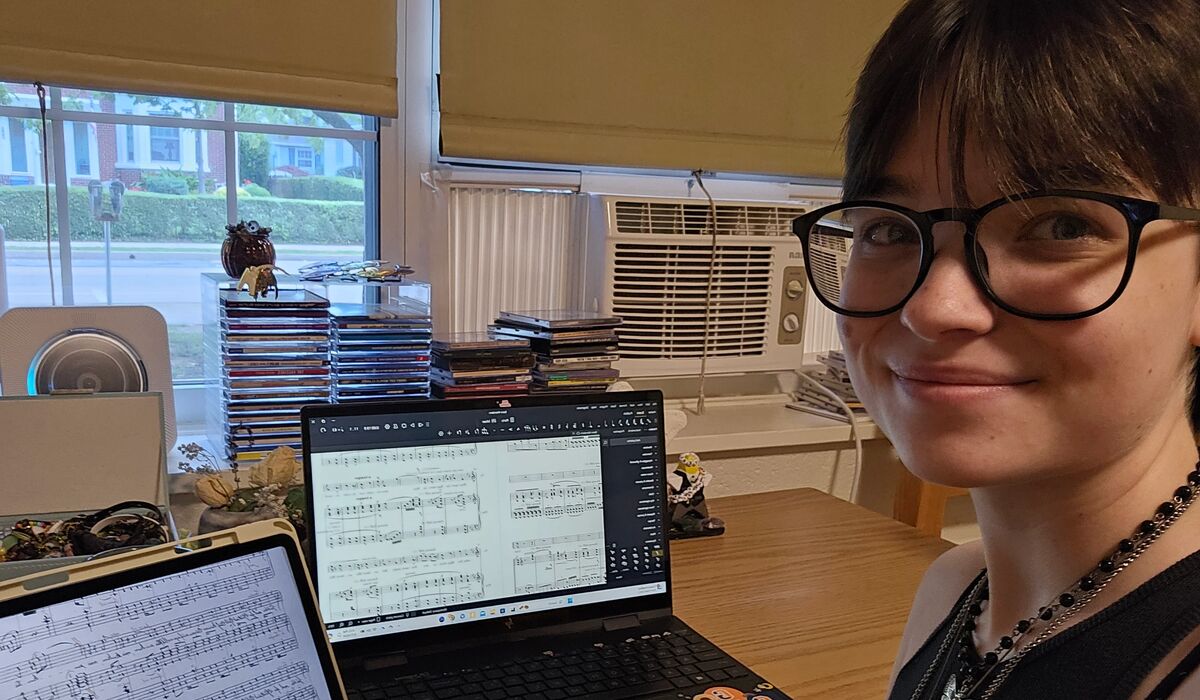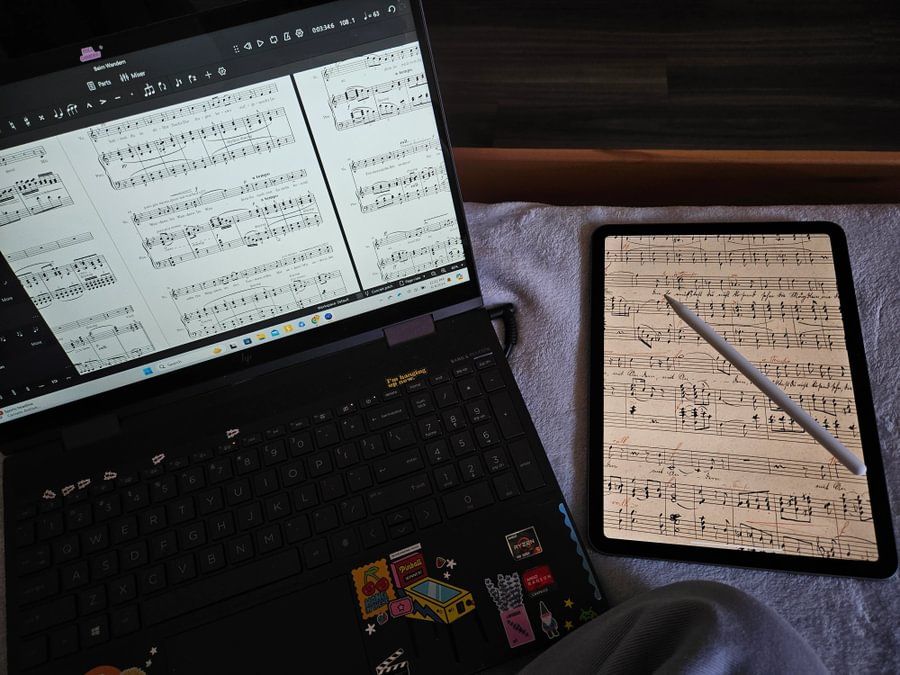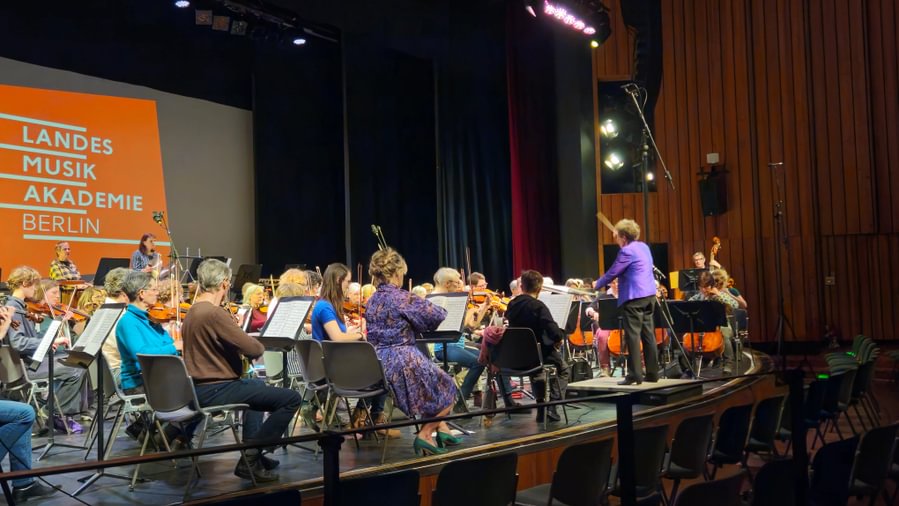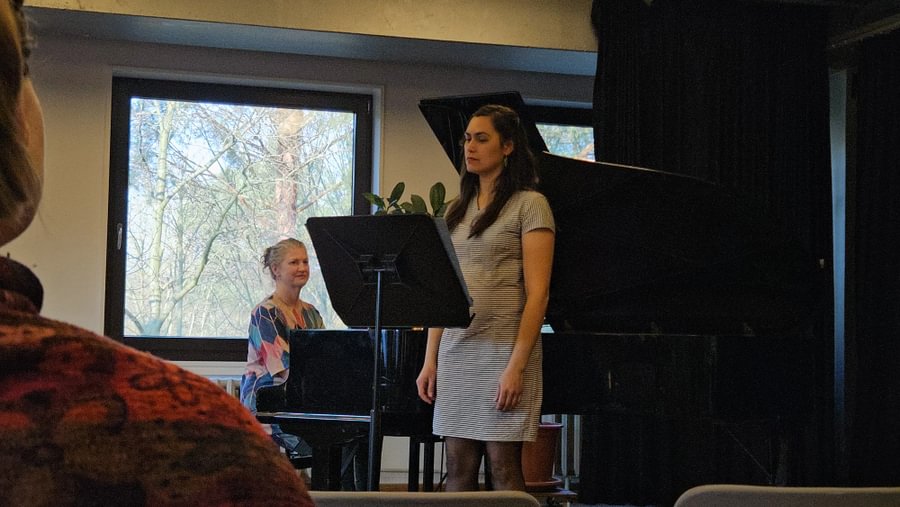
Music Prof. Jocelyn Swigger and Riley Dunbar ’27 are working together to revive and publish the long-lost works of 19th-century composer Agnes Tyrrell, blending research, performance, and mentorship in a transformative academic journey.
When Riley Dunbar '27 walked into Paul Recital Hall during her first year at Gettysburg College, she didn’t expect to stumble upon a project that would change the course of her academic career and launch a multi-year journey across archives, continents, and centuries.
There, she heard Music Prof. Jocelyn Swigger perform selections on the piano by a 19th-century Czech composer named Agnes Tyrrell. Moved by what she heard, the double major in music and cinema and media studies from Waldorf, Maryland, looked up Tyrrell’s music—and found nothing.
The very next day, Dunbar connected with Swigger and told her just how much the music had affected her. Swigger, who began researching Tyrrell’s life and work nearly seven years ago, invited Dunbar to join the effort to publicize the composer’s lost legacy. What followed was a rich collaboration that has led to the publication of Tyrrell’s work, international performances, and the development of skills and knowledge central to Gettysburg’s approach to education.
A transformational music journey
Swigger’s own discovery of Agnes Tyrrell began by chance. As she was flipping through a dictionary of women composers, she happened upon Tyrrell’s entry. What caught her attention at the time was that Tyrrell had dedicated a set of etudes to Franz Liszt, the most prominent pianist of the 19th century.
“It’s kind of like dedicating a song cycle to Taylor Swift today,” Swigger said. “Liszt didn’t just acknowledge the music—he praised it and suggested fingerings, which means he really engaged with the work.”
Despite Liszt’s praise, Tyrrell’s music was almost entirely absent from public consciousness. Curious and persistent, Swigger continued to search for traces of Tyrrell’s work, scouring internet resources and looking for recorded performances, but finding none. Eventually in March 2022, she acquired a recently-published collection of some of Tyrell’s piano pieces and was quickly enamored with the works.
With support from a Research and Professional Development grant from Gettysburg College, Swigger traveled to Brno, Czech Republic, where Tyrrell’s manuscripts were meticulously preserved in the Department of Music History at the Moravian Museum. The archive granted her permission to photograph the manuscripts and publish the music, but not the original archive images.

After collecting images of Tyrell’s works, Swigger recruited Dunbar to typeset, edit, and publish the music. Supported by a Kolbe Research Fellowship, Dunbar spent eight weeks in the summer of 2024 completely immersed in Tyrrell’s compositions. Using music notation software, Dunbar painstakingly reconstructed the music from Swigger’s photos, rewriting the music note by note. Swigger then sat down with Dunbar to review each rewritten notation for accuracy while verifying Tyrell’s musical intent. Through this collaboration, Dunbar has developed a deep understanding of Tyrrell’s musical style.
“I’m literally building music from the ground up,” she said. “I’m seeing how Agnes works with melody and how that relates in counterpoint. I’m understanding a lot more about tonality and harmony, and that’s been incredibly helpful for my own work as a composer.”
Gaining skills such as problem solving and creativity through Swigger’s mentorship has also led Dunbar to a partnership with global implications.
“Riley really understands harmony and counterpoint in such a deep way now,” Swigger noted. “It’s exciting to see her develop expertise in this style. Riley and I truly are two of the top world scholars of this music right now.”

Turning a dream into global reality
This past March, the team’s work reached new heights when they were invited to Berlin, Germany, to hear Tyrrell’s overture performed by the Frauen Orchestra Project. Organized for International Women’s Day, the performance featured an all-women orchestra playing works by female composers, including the premiere of Tyrrell’s 55-page overture in E flat that Swigger and Dunbar had prepared.
This performance marked the overture’s first appearance on stage since 1874. Witnessing it was emotional for both collaborators, and Dunbar received a special invite to take a bow on stage. Said Dunbar, “It was just crazy to see it come to life, knowing how much work went into it.”
Swigger, who was “moved to tears” by the orchestra’s performance, also made her own Berlin premiere, playing a recital of Tyrrell’s music for piano.

Together, their dedicated work has resulted in more than 70 pieces typeset and at least a dozen published works, but the work is far from finished. Dunbar, who is pursuing the Creativity, Entrepreneurship, and Innovation Pathway as part of Gettysburg’s Guided Pathways program, was awarded another Kolbe Fellowship this summer to arrange Tyrrell’s compositions for broader instrumentation, making it easily playable across the world. The Pathways combined with guidance from a Personal Advising Team have enabled Dunbar to see the powerful connections between her work alongside Swigger and the world beyond campus.
“The reflections encourage me to consider how my time and experiences at Gettysburg are having a bigger impact on me, my community, and my social and professional development,” Dunbar said.
Swigger, meanwhile, will do an official world premiere of Tyrrell’s complete etudes on campus in September and hopes their collaborative work will create more opportunities for smaller orchestras to play the music.
“My dream is that by Agnes Tyrrell’s bicentennial in 2046, there will be concerts all over the world celebrating her music—concerts I didn’t organize,” said Swigger.
Thanks to the dedication of two Gettysburg scholars, that dream is well on its way to becoming a reality.
Develop your passion for music and discovery at the Sunderman Conservatory of Music
Related Links:
External Links:
By Corey Jewart
Photos provided by Riley Dunbar ’27
Posted: 06/23/25